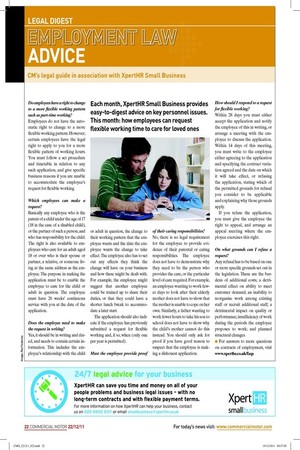ADVICE
Page 18

If you've noticed an error in this article please click here to report it so we can fix it.
CM’s legal guide in association with XpertHR Small Business Each month, XpertHR Small Business provides easy-to-digest advice on key personnel issues. This month: how employees can request flexible working time to care for loved ones
Do employees have a right to change to a more lexible working pattern such as part-time working?
Employees do not have the automatic right to change to a more lexible working pattern. However, certain employees have the legal right to apply to you for a more lexible pattern of working hours. You must follow a set procedure and timetable in relation to any such application, and give speciic business reasons if you are unable to accommodate the employee’s request for lexible working.
Which employees can make a request?
Basically any employee who is the parent of a child under the age of 17 (18 in the case of a disabled child), or the partner of such a person, and who has responsibility for the child. The right is also available to employees who care for an adult aged 18 or over who is their spouse or partner, a relative, or someone living at the same address as the employee. The purpose in making the application must be to enable the employee to care for the child or adult in question. The employee must have 26 weeks’ continuous service with you at the date of the application.
Does the employee need to make the request in writing?
Yes, it should be in writing and dated, and needs to contain certain information. This includes the employee’s relationship with the child or adult in question, the change to their working pattern that the employee wants and the date the employee wants the change to take effect. The employee also has to set out any effects they think the change will have on your business and how these might be dealt with. For example, the employee might suggest that another employee could be trained up to share their duties, or that they could have a shorter lunch break to accommodate a later start.
The application should also indicate if the employee has previously submitted a request for lexible working and, if so, when (only one per year is permitted).
Must the employee provide proof of their caring responsibilities? No, there is no legal requirement for the employee to provide evidence of their parental or caring responsibilities. The employee does not have to demonstrate why they need to be the person who provides the care, or the particular level of care required. For example, an employee wanting to work fewer days to look after their elderly mother does not have to show that the mother is unable to cope on her own. Similarly, a father wanting to work fewer hours to take his son to school does not have to show why the child’s mother cannot do this instead. You should only ask for proof if you have good reason to suspect that the employee is making a dishonest application. How should I respond to a request for lexible working?
Within 28 days you must either accept the application and notify the employee of this in writing, or arrange a meeting with the employee to discuss the application. Within 14 days of this meeting, you must write to the employee either agreeing to the application and specifying the contract variation agreed and the date on which it will take effect, or refusing the application, stating which of the permitted grounds for refusal you consider to be applicable and explaining why those grounds apply.
If you refuse the application, you must give the employee the right to appeal, and arrange an appeal meeting where the employee exercises this right.
On what grounds can I refuse a request?
Any refusal has to be based on one or more speciic grounds set out in the legislation. These are the burdens of additional costs; a detrimental effect on ability to meet customer demand; an inability to reorganise work among existing staff or recruit additional staff; a detrimental impact on quality or performance; insuficiency of work during the periods the employee proposes to work; and planned structural changes.
● For answers to more questions on contracts of employment, visit www.xperthr.co.uk/faqs













































